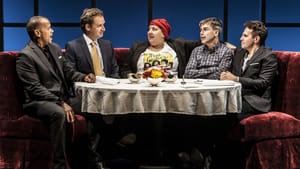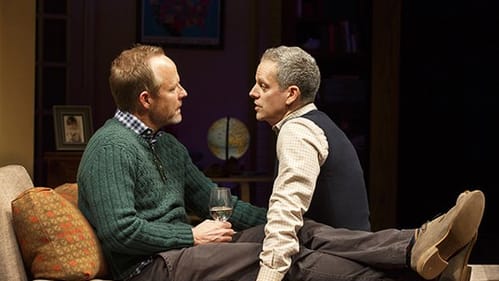Stay in the Loop
BSR publishes on a weekly schedule, with an email newsletter every Wednesday and Thursday morning. There’s no paywall, and subscribing is always free.
Two plays, four dads
Gerrard's 'Steve' and Parnell's 'Dada Woof Papa Hot'

With gay couples taking on parenthood more frequently these days, it’s only natural that the dads should have their turn as the focus of family situation comedies. The surprising achievement of two new plays — Mark Gerrard’s Steve and Peter Parnell’s Dada Woof Papa Hot — is that they are able to balance laughter and pain with such depth and dexterity.
Steve — about a couple named, respectively, Steven and Stephen — disarms you from the get-go. When you enter the theater, the actors (four men and one woman) are gathered around a piano, singing a medley of Broadway songs. Only as the show goes along do you realize that the titles of the lighthearted songs they continue to sing between scenes — “We Got Each Other,” “Friendship,” “Neverland,” “Mein Herr” — reflect the serious issues they’re facing, including parenting, infidelity, midlife crises, and mortality.
Stephen discovers revealing photos of best friend, Matt, on Steven’s phone. He acts out by having his own dalliance on the side. Oh, and did I mention that Carrie, their BFF, is dying of cancer? No wonder their favorite song is “Ya Got Trouble.” No wonder Zak, their neglected (offstage) eight-year-old son, is acting out. (Stephen: “He’s stealing!” Steven: “No, he’s just borrowing.”)
Steves upon Steves
There are many playful touches to Steve, such as the additional minor characters who bear the title name, including an Argentinian waiter named Esteban and an offstage personal trainer named Steve. There’s also a hilarious “sexting scene” in which Steven balances two phones — one on which Zak is asking for ice cream and another on which his secret lover is sending him explicit texts, which are projected on the upstage screen. Cynthia Nixon directs these diversions with a sure hand, and the talented ensemble, notably Malcolm Gets as Stephen and Ashlie Atkinson as Carrie, is strong in voice and heart.
Like Oscar Wilde and Noël Coward before him, playwright Gerrard is inviting us to laugh at his characters’ follies, vanities, delusions — and above all, their fear of growing old and losing their desirability.
Struggles minor and major
While Gerrard keeps it light in order to make life bearable, playwright Peter Parnell digs deep into the challenges of parenthood. In Dada Woof Papa Hot, Alan and Rob and their closest married friends (two couples, one gay and one straight) fret over issues ranging from nannies to egg donors to recapturing what it was like not to have kids. While some of the concerns seem superficial (like angst over preschool choices), the basic issues of parenting and fidelity, with which all three couples struggle, are not.

“Nobody has done the research yet,” says Rob, about being a gay parent. Their three-year-old daughter, Nicola, is going through a phase where she prefers “Dada” (Rob) to “Papa” (Alan). “Who doesn’t want to be wanted?” says Rob, offering consolation. But it’s not enough for Alan, who is crushed by the rejection, fearful that Rob favors Nicola over him. He’s jealous of his own daughter, and he feels lost. “It’s so fragile, what we have,” Rob offers with compassion. Scott Ellis directs with skill and sensitivity, and, again, the ensemble (featuring a vulnerable John Benjamin Hickey as Alan) is solid.
Sweet endings
Each play ends on a sweet note. Son Zak is playing the saxophone, so things are better with the Steves. Daughter Nicola finally asks Alan to read her favorite bedtime book, and the request is a sign of hope for the troubled couple. “Early one morning, Peter opened the gates,” begins Alan, in a tear-inducing moment.
These two heartfelt plays give us a valuable insight: All couples, whether gay or straight, face the same fundamental life issues of parenthood and long-term commitment. “I’m afraid because I don’t feel gay anymore,” says Alan wistfully at one point in Papa Woof Dada Hot. Playwright Parnell may be saying that, like many, Alan has bought into the stereotype that society has imposed on gay behavior, and now he understands that what he’s experiencing is, to put it simply, being human.
(Full disclosure: Mark Gerrard was a student of mine at NYU’s Tisch School of the Arts, but his play, Steve, was written and submitted for production prior to his enrollment in our program.)
What, When, Where
Steve, by Mark Gerrard. Cynthia Nixon directed. Through January 3, 2016 at the New Group at Signature Center, 480 West 42nd Street, New York. thenewgroup.org
Dada Woof Papa Hot, by Peter Parnell. Scott Ellis directed. Through January 3, 2016 at Lincoln Center’s Mitzi E. Newhouse Theater, 10 Lincoln Center Plaza, New York. lct.org
Sign up for our newsletter
All of the week's new articles, all in one place. Sign up for the free weekly BSR newsletters, and don't miss a conversation.
